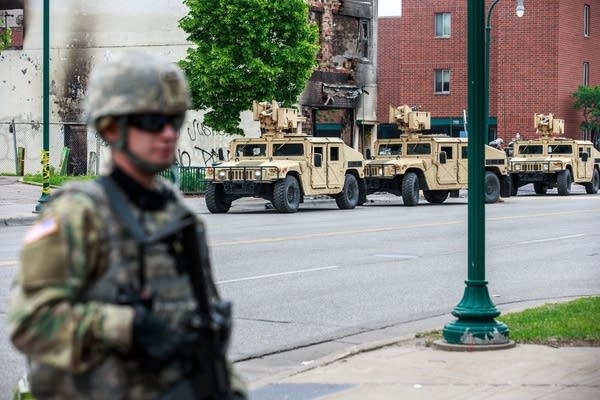Gov. Walz deploys MN National Guard for Chauvin trial security

Go Deeper.
Create an account or log in to save stories.
Like this?
Thanks for liking this story! We have added it to a list of your favorite stories.
Gov. Tim Walz issued an order Friday authorizing the National Guard to respond in the event that high-profile court trials in Minneapolis spark civil unrest. Former Minneapolis police officer Derek Chauvin, charged in the death of George Floyd, is scheduled to go on trial on March 8.
The governor's order states that the mayors of Minneapolis and St. Paul have requested state help as the trials of Chauvin and three other former officers charged in Floyd’s death, Thomas Lane, J Alexander Kueng and Tou Thao, approach.
“We submitted a request for support from the Minnesota National Guard last year,” says Minneapolis Mayor Jacob Frey,” and have been participating in regular planning meetings with law enforcement agencies to help ensure strong and persistent lines of communication are open with all relevant partners.”
The Guard troops will supplement local law enforcement agencies in keeping the peace and ensuring public safety while allowing for peaceful demonstrations. The order leaves it to the state’s adjutant general, Maj. Gen. Shawn Manke, to determine the size, timing and other details of the deployment. The money will come from the state's general fund.
Turn Up Your Support
MPR News helps you turn down the noise and build shared understanding. Turn up your support for this public resource and keep trusted journalism accessible to all.
Chauvin is charged with murder and manslaughter in Floyd’s killing. Video shows Chauvin with his knee on the handcuffed man’s neck and back as Floyd says he can’t breathe.
Local, state and federal authorities have been preparing for months, fearing a repeat of violence that erupted after protests began in Minneapolis and spread worldwide, leading to a national reckoning over race. Last year, thousands of people marched to protest Floyd's death while a smaller number of people rioted, set fires and broke into businesses.
“There are some public safety events for which you cannot plan, and there are some for which you can,” Walz said in a statement. “The upcoming trials of the former officers involved in the death of George Floyd have raised the potential of civil unrest in Minneapolis, St. Paul and nearby communities.”
Trials for Thao, Lane and Kueng are set for later in the summer.
The order will be in effect until the end of the year. However, the Guard can be recalled earlier if they are not needed or the order is properly rescinded.
The order steps up pressure on legislators to authorize funding for local law enforcement agencies from across the state that have been asked to help with security during the trials.
The DFL governor has proposed a $35 million State Aid and Emergencies account that would reimburse local governments for providing mutual aid for “unplanned or extraordinary public safety events,” including but not limited to the trials.
Republicans pushed back this week, calling the proposal a bailout for poor budget decisions and anti-police sentiment among Minneapolis leaders. They want Minneapolis to foot the bill.
The governor's statement said the state fund would be a “critical tool" to ensure there are enough officers on the ground. The Guard is not considered a law enforcement agency, so it must partner with police to prevent or respond to any unrest. His office said that will require significant contributions of officers from other cities and counties, which will come at a cost.


